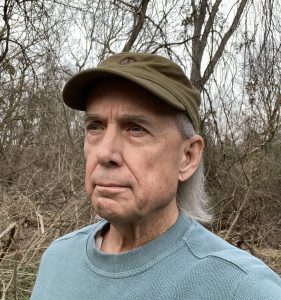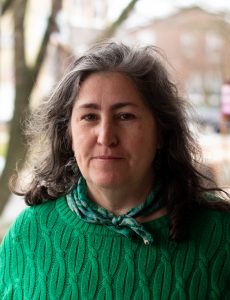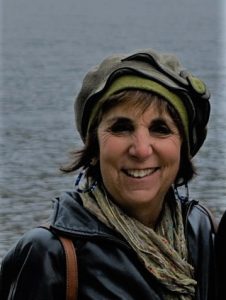
Nature’s assorted players stir themselves into motion, from the lowly insects to the elusive reptiles to the lofty mammals. It is early morning, and there are approximately thirteen hours of daylight ahead. Thirteen hours of creaturely struggle and ambition and hope. And choices. Those who make the correct choices will survive until evening. The others, unfortunately, will – today – succumb to the realities of corporeal competition and natural consequences.
I ponder all of this while lying at the edge of dawn on the second day (first morning) of a two-day wilderness hiatus, alone in a small tent, flap open, with my loyal dog Sophie lying halfway in. Her paw is on my arm, and her muzzle is pushing insistently against my cheek, urging me to action. “Nature calls,” she might say if she could speak humanese. Habits must be as strong for dogs as they are for humans. At home, I would now open the back door and let her go outside. Here, we are already outside. But she still wants me to rise and accompany her, as if my presence will provide official sanction for her morning business. There’s an unalterable ritual involved, and it must unfold in its complete form: man with dog, walking, sniffing, walking further, stopping, peeing and/or shitting, turning, and repeating, etc. All creatures have rituals, from the spider-web spinners to the lumberjack beavers to the corporate executives practicing the latest Tony Robbins techniques for business success. Rituals are probably as important for survival as good choices are.
I lie on my back now, part way out of the tent, staring at the green translucence of the trees above, listening to the soft rush of the nearby river, and savoring this groggy yet mindful moment. My mind typically races like this first thing upon waking up. It’s as if, being deprived of reality-based thought during the dreaming hours, the brain is making up for lost time, probing and savoring and analyzing every bit of worldly sensory data it can get its hands on. At times, maybe I think too much for my own good.
The dog has given up on me for the moment and is groping and probing through the trees at the edge of the campsite. Above the rustling, I hear a change in the steady sound of the river. It sounds like a small boat or canoe, with the high-pitched splashing of oars plus the lower rumbling of the vessel as it cuts through the water. I push myself to a semi-sitting position and peek around the edge of the tent toward the river. The stiffness in my joints probably comes from a combination of yesterday’s long walk and the effects of sleeping in the damp, cool September air. By the time I look, the craft has passed and is no longer in sight through the clearing in the trees and bushes lying between my tent and the water’s edge.
As I stand, Sophie returns to me, stumbling and limping ridiculously, oblivious to her own woundedness in the form of a sprained rear right leg. Sometime yesterday evening, she apparently got caught in a hole or lost her footing on the trail or something. I first noticed the limping as I sat by our campfire last night, watching her chase bugs. I say I noticed because the way she’s acting, it seems that she is unaware of any problem and oblivious to any pain. A dog in denial, Sophie disappears again for a few moments into the bushes north of the campsite and returns with her nose ringed with fresh brown dirt. Her fur is wet from the dew that covers everything surrounding us. She then disappears in the direction of the river. I can hear the splashing sounds as she tests the water, no doubt slurping up a few mouthfuls in the process. Sophie is happy to romp and jump with abandon, worsening her leg in the process, the pain being simply an irrelevant inconvenience. I think to myself (here we go again), is it denial, or is it, instead, transcendence? I mean, if Sophie could talk, would she say (in denial), “No problem, I’m okay, really. Let’s go, man.” Or would she explain, “Hey, life goes on. Everybody hurts to some extent. I do not separate myself from my injuries. Rather, I become, or I am, my injury. Okay, let’s go, man.” Canine Zen.
I spread a blanket close to the front of the tent and sit upon it. The campfire is smoldering slightly, so I stir it up and throw in some newspapers and kindling. In no time, the fire returns to life. I add the half-burned log that I moved aside last night before falling asleep. Then, opening the ancient Coleman stove on the ground nearby, I commence pumping, then turning the knob, then holding a flaming match until the fire poofs to life. When I walk to the river to collect water in an aluminum pan, dog frumping along by my side, I look both ways, up and downstream, for signs of the canoe or boat that passed by. Nothing in sight.
The risen sun is brilliant over the river. The light is playing and sparkling on the moving water, part direct sunlight and part reflective light from overhanging branches and leaves. This will be a perfect morning for photography. Maybe I’ll get some good close-up macro shots of the dewdrops on leaves and on the few remaining late summer asters or fleabane or touch-me-nots. I am looking forward to the continuing solitude. This area, being isolated and primitive, doesn’t attract many campers at any time, but now, in late September, I’m not surprised that I am the only overnight visitor. Before returning to my breakfast, I lean down and splash an exhilarating double handful of water into my face.
Back at the blanket, the dog sits by me as I wait for the coffee water to boil, her haunches pressed against me, face across my right knee, eyes turned up toward me. It’s that look of pure adoration and loyalty of which only dogs are truly capable. I remove three eggs from a plastic container, cracking and dumping them into a small flat pan. With the pan over the second flame on the Coleman, I stir the eggs then sit back down to wait some more.
My mind, as I have said, tends to ramble in the early morning, and now I’m thinking of the dewdrops and how, in a close-up photo, they often appear so deliberately placed, in patterned rows along a leaf-edge or neatly arranged around the circle of a flower’s central disk. It is all so purposeful, so well planned. Furthermore, it’s a purpose that can only be revealed to someone taking the time to look and look close. Still, the beauty and the purpose speak for themselves, once discovered. In human affairs, purposefulness — though equally real — is less tangible and more obscure, even to the earnest seeker. Human purpose is also open to endless and conflicting interpretations, and it insists upon its own explanation. How many times do we ask one another, “Why did you do that?” or something similar? With nature’s purpose, however, an explanation is beside the point. It just is. Of course, I’m only speaking for myself here.
As if my musings on human purpose have the power to call matter into being, I hear a decidedly human-like rustling in the bushes. It’s coming from the direction of a narrow trail that heads in a southerly direction along the river bank. I catch sight of increasing shadows and movement in the bushes just before my visitor emerges, dressed in a uniform that immediately identifies her as a park ranger.
“Hi,” I start the conversation.
“Hi. Did you sleep here last night?” As she speaks, she is wiping spider webs from her wet dew-splattered sleeves and from the thighs of her pants.
“Yes.” I reach down to remove the egg pan from the fire and turn off the flame.
“You didn’t happen to see a canoe go by with three people – teenagers – did you? Sometime yesterday, in the late afternoon?” She removes a small notebook and pen from her breast pocket and prepares to record the very next words to emerge from my mouth.
“No. I got here in the morning, but I was out walking most of the day. I thought I heard something this morning, though, which I now guess was you … in a canoe, maybe? Otherwise, I haven’t heard or seen anything unusual.” She’s writing as I ask, “Is something wrong? Are they missing?” I realize in a split second that it’s probably a stupid question, but the ranger doesn’t treat it so. Nor does she confirm that she, in fact, arrived by boat.
“Well, they came in yesterday. A friend was supposed to pick them up first thing this morning about five miles downstream from here, at the Fulton Bend camping area. But, this morning, they weren’t there.”
“Are there any other campsites between here and there?”
“Yes. Windham Hollow. About two miles downstream, near a spot where the rapids get pretty rough. It’s really treacherous now with all the rain we’ve had. I’m worried they may have gotten themselves in trouble. There are notices at every launch point telling people not to canoe down that far unless they are trained and properly equipped. But, you know, sometimes people don’t listen to advice like that.”
“Uh-huh,” I agree, pouring boiling water over a pile of instant coffee crystals in a yellow plastic cup and turning off the flame. “Would you like some coffee?”
“No, thanks,” the ranger says absently as if I have just interrupted her train of thought. When she continues, I detect a condescending tone in her voice. “It’s the simple truth. Like they know that the danger is there, but just figure they’ll be the exception. Like they’re invulnerable or something.” She pauses as if reflecting upon her statements. “Well, I’m going to head downstream. I just stopped here when I saw the smoke from your fire. If you see anything, I’d appreciate it if you’d call the park office. The number is on the park brochure; if you have that. If necessary, they can get in touch with me.” She removes a phone from her belt, looking at it closely as if to evaluate its condition.
“Okay, yeah, got it.”
“By the way, I’m Ranger Lazinski.” From reading her black plastic name tag, I already know her full name to be Sharon R. Lazinski.
“I’m Eric Adams. Nice to meet you. I’ll call if I see anything.” I’m ready to shake hands, but Ranger Lazinski has both of hers occupied with the pen, notebook, and phone.
Saying “Thanks,” she turns and walks briskly back down the trail in the direction of her (I assume) canoe. Just before disappearing into the thicket, she turns and – without smiling – says, “Enjoy the rest of your visit.”
“Thanks,” I say in return, with a quick wave.
As the ranger vanishes, my thoughts turn from the three teenagers, and their possible plight, to thinking about how, at any given moment (like this one), there are millions of separate lives going on across the planet, running their separate and diverse courses, sometimes intersecting at accidental and unpredictable moments. Two or more unrelated life stories can thereby become connected in important ways, each affecting the other in, again, an unpredictable, or at least unknowable, manner. So, here is me, here is Ranger Sharon R. Lazinski, here are three teenagers. Our lives are now connected, like it or not. Even though I have not encountered the teenagers themselves, I do know about them, so they are in my life. And actually, even though the teenagers do not know about me (yet?), I am, in a sense, part of their lives, too.
What does this mean? It means that I think too much, about too little, too early in the day; that’s what it means. By noon, these questions will seem irrelevant. I know this from experience.
This latest stream-of-consciousness session, however useless, brings me around to consider the various intersections in my own recent life, which have brought me to this day and this campsite and this glorious place of mostly isolated relaxation and reflection.
It all begins with the fact that I am losing my job. I am being fired. Or, as they put it gently in the insulating world of academia, I have been “retrenched.” I looked up these two words. To retrench is to “cut down, reduce, or diminish.” To fire is to “dismiss from a job.” While the former sounds more polite and somehow acceptable, the latter is clearly more accurate, from my perspective anyway.
At any rate, my college teaching position is being eliminated (not “reduced” or “diminished” but wiped out entirely). Therefore, by default, I will disappear (or be “retrenched”) along with it. They tell me that I should not take it personally; it has nothing to do with me: not my professional performance or my obvious contributions to the college or my potential future contribution, etc., etc. It’s just that, well, I’ve become expendable. In these past five years, I have acquired tenure, earned the respect of students and colleagues, and even been encouraged to pursue the administrative route. Encouraged. Reinforced. Provided with a sense of future and mission. And then, whoops, sorry, no longer needed.
It was a Thursday, 11:00 a.m., out of the blue. I am invited to a meeting, and the bomb is dropped. Wow, numbness sets in, then denial, then confusion, then anger, then an overwhelming sense of betrayal and, strangely, embarrassment. I am embarrassed that I have spent five years of my life with an organization that could do this to someone, based on expediency and economics alone, with no regard for merit or reputation or experience or ability. Is it only in academia that one could get away with such inept, counter-productive, short-sighted management? Probably not, actually. But from the middle of such situations, it’s natural to feel singled out.
Back at the college, it was somewhere between the “confusion” and “anger” phases that I wrote a piece for the college newspaper, which, of course, they immediately agreed to print, given its overtly inflammatory tone and provocative potential. Laced with phrases like “the administration’s disgraceful secret tactics” and “robbing our students of the education they purchased in good faith,” the article described how our university had lied to students, lied to faculty, sabotaged collaborative bottom-up reforms, and insulated itself from input and from the influence of students and faculty in whose name it exists. All to serve the holy cause of numbers and dollars. And on and on and on. They printed the article verbatim, unedited. Soon the local paper called, then the local radio station, then the public station fifty miles away in Binghamton. It seemed that I had single-handedly created the issue-of-the-week. I had, at the same time, seriously angered the entire third floor of the college administration building. This was not what I had in mind, or so I told myself and others. I was as honestly surprised as anyone when this mild-mannered, soft-spoken, normally polite assistant professor turned into a raging media pit bull.
The word “betrayal” became a bouncing projectile in the ensuing verbal war between the college administration and me. They said, in effect, “You have betrayed the college, indeed the whole state system, with your rantings and ravings.” They stopped just short of extending my betrayal to “education in general throughout the universe as we know it.” For my part, I continued to accuse the third-floor gang of betraying me, lying to me, betraying all of us, which ultimately hurts the students, and on and on and on.
So, the whole damn thing just blew up beyond reason and, now, here I am, on a two-day retreat, at the insistence of my loving and understanding wife, in an isolated campsite in a relatively remote part of Adirondack Park. Back home, the sparks continue to fly, but – for now – I am pleasantly and refreshingly separated from all of it. Physically separated, that is. For now.
After my breakfast of coffee (two teaspoons, as usual, for the first eye-opening cup) and scrambled eggs, eaten standing up, I start out with the dog. Even away from home, in a strange environment, the morning dog-and-master walk is undertaken almost unconsciously. This is simply what we do first thing, usually before breakfast at home, without stopping to decide or consider. As the dog begins her goofy limp-dance, I am reminded that this should be a brief walk for the dog’s sake, though she will certainly not agree.
A narrow trail leads east from the campsite toward the river’s edge, joining — at roughly 90 degrees — another trail running north and south about ten feet from the water; it’s the same trail from which Ranger Sharon (what was her last name?) appeared a short time before. We take the southern route, finding that the trail narrows rather suddenly, becoming overgrown with various bushes and small trees at waist and chest level. At this time of day, it is impossible to avoid becoming soaked from the dew. However, the terrain is perfect for the dog who slips beneath the wet canopy just ahead of me. We walk a short way, a hundred yards or so, and I turn to go back just as the dog – apparently distracted by a squirrel or some other real or imagined creature – takes off down the trail, silly-looking bum leg dangling behind. Soon I lose sight of her beneath the brush, but I can hear that she has stopped and is now sniffing and snorting and pawing the ground not far ahead of me. A moment later, she returns with a blue fluorescent-type baseball cap dangling from her mouth.
“Oh, nice find, Sophie,” I say sarcastically, then notice that the cap, clean and new-looking, lacks signs of having been on the ground for any period of time. Walking on, I discover why.
As soon as I see the body sprawled across the trail, I draw in a spontaneous and audible breath. Then, some sort of survival-rescue instinct kicks in, and I am kneeling by the body, quickly but calmly checking for vital signs. It is a male, 17 or 18 years old, with longish dark hair, dressed in a multi-colored flannel shirt and black jeans. Yes, there is breathing. No, there is no blood in sight. No, the body doesn’t look contorted in any way that would suggest broken bones. There are no signs of struggle. In fact, the young man at my feet appears to be simply sleeping. This hunch is confirmed when, as I nudge his shoulder, he awakes suddenly with a moan, a cough, and a groggy, confused expression that is quickly replaced by a terrified look of realization and dread.
“Oh, God,” are his first words.
“What is it? How did you get here? What’s…”
He raises his head from the dirt to speak. “My friends. Julie. Brandon. I think Bran’s dead.” He points feebly back up the trail from which he had apparently come as his head falls back to the ground.
“Can you stand? Are you hurt?” As he seems to make an attempt to move and perhaps stand, I say, “Come on, we’ll go and get some help for your friends.”
I reach down, grasping him by the shoulders and helping him into an approximate standing position. I hold tight to his staggering, exhausted frame as we negotiate the trail back toward the campsite. Sophie, sensing that this is serious business, keeps her distance, lumbering on ahead of us but looking back frequently.
“What’s your name?” I ask, mostly just to make him talk, to keep him awake and, perhaps, alive.
“Tom.”
“Okay, Tom, look, everything is going to work out here. You can just rest while I call the park rangers. They’ll get an ambulance in here to…” I stop in mid-sentence. To what? Take your dead friend (or friends) to the morgue? I don’t finish the sentence.
It takes less than five minutes for us to reach my tent. I help Tom to the blanket, where he lies, head on the ground again, staring straight ahead with eyes open in a blank stare. The dog resists the likely temptation to go over and lick Tom’s face or nuzzle against him.
In less than 15 minutes, Ranger Sharon (Lazinski, I am reminded as I read her name tag) arrives at the campsite to announce that an emergency medical team is on the way. When the two EMT vans arrive, the medical technicians (four in all) help Tom into one of them. Someone suggests that I ride along (as a witness?), so I join the ranger in her state-issued, gray Ford Taurus, and she allows the dog to jump into the back seat. Our caravan, led by the ranger’s car, moves up the road toward Windham Hollow. I am aware of a general mood of trepidation surrounding us, like the hint of fog that engulfs the three vehicles as they move with urgent deliberation. As we bump along, tires shoot occasional stones, each with a pop and a smack as it hits a tree or a softer whoosh as the stone penetrates the thick forest brush along the road.
We park at Windham Hollow and move, as a team, down the trail, and through unoccupied campsites, toward the river. It is not surprising to find nothing at or near the riverbank since Ranger Lazinski had only recently searched this area from her canoe. It is deeper in the brush, at least 20 feet from shore, that we discover the two bodies, still soaked and – at first – both looking to be absent of any life signs. A closer inspection reveals this initial impression to be half true.
A male, about 18 years old, taller but much thinner than Tom, is spread grotesquely beneath some branches, with arms and legs at awkward and random angles, a large pool of dried blood beneath his bruised head. This must be Brandon. Even though the eyes are closed, the badly bruised face wears an expression of resignation that seems to reveal the young man’s final reflections upon the life draining from his battered body.
Julie, unconscious but breathing, rests her head upon the right thigh of her lifeless companion. She awakes moments after our arrival. With eyes open, her face forms the same expression of dreaded remembrance that Tom had displayed upon awaking on the trail.
As the emergency team takes over, Ranger Lazinski walks off toward the south as if she has spotted something. Sure enough, she soon bends to pull the battered front end of a canoe from some brush that must be about thirty feet from the water. Amazingly, someone had the presence of mind to drag the damaged canoe from the water after the accident.
Julie is carried to the ambulance that already holds Tom, while Brandon — his body placed on a stretcher and covered head to toe with a sheet – is solemnly placed in the back of the second vehicle. After turning around in the small parking area, the vans pull away. As I stand motionless, watching, an unexpected and nameless sensation comes over me. I become contemplative, not in itself unusual, but, in this case, it’s an empty sort of contemplation. It’s as if the events of the previous – how long, one hour perhaps, a little more? – are infused with significance and deep implications that I can only sense but not yet truly comprehend.
After the EMT vans disappear through the trees, Ranger Lazinski looks at me as if searching for something profound to say. Instead, she comes up with the predictable, “Are you okay?”
“Yes, thanks. Boy, it’s something else, isn’t it, the way things happen?” I turn my head to look out over the scene toward the river as if searching for a clue or an explanation.
“Yeah, well, you know, nature doesn’t play around. But she does play fair. It’s the simple truth.” I turn back to face her and wonder if she is repeating a quotation from somewhere or if she has just manufactured that bit of wisdom on the spot. Then she continues with a shrug of her shoulders and a wave of her left hand, palm up, in the direction of the river.
“I mean, the rules are plain. They’re obvious. Play it straight, and you’re okay. But, buck the natural order – by running dangerous rapids over a rocky river ledge, for example – and you have to accept the consequences. It’s a brutal truth, yes, but a simple one at the same time.”
The ranger walks a few steps in the direction of her car, but I can tell she isn’t finished speaking. “You can depend upon the songs of the birds with as much confidence as you can count on the deadly grip of the grizzly bear. Mother Nature is always true to her word. And consistent, too, with both the good and the bad.”
With the hint of a laugh, she adds, “And that’s something you don’t find too often in the human realm, do you, that consistency?” Then with another short laugh and slight embarrassment at her own pontificating, she concludes, “Hey, maybe that’s why I’m a forest ranger.”
I offer my own muttered chuckle in response and say, “Yeah, well, thanks. I’d better go pack up my stuff. Time to get back to civilization, as they say.” The dog, forgotten these past 10 or 15 minutes, limps into sight at the sound of my call, dripping from an apparent dip in the cooling river.
“Okay, let’s go,” says Sharon. So we climb into her car and drive to my campsite.
With my loyal wounded companion beside me, I make my way down the trail from the dirt road to my tent. The muffled rumble of the ranger’s car, fading with distance, is replaced by the persistent buzzing chirp of the curious chickadee that watches me from a nearby tree. The wind can barely be heard moving the trees overhead while the river broadcasts a soft flowing gurgle.
I sit on the blanket and concentrate upon these sounds like a mantra, relishing their persistence and … what? Conviction? Confidence? My body seems to absorb the sounds, becoming heavy in the process. With eyes closed, I feel my new weight as I sink and settle into the blanket. This is the most relaxed I’ve been during these two days, indeed, in a long time. The sounds wash over and around me, cleansing me and purifying the moment.
In this state of balance and tranquil awareness, I am not mindful of the competing sounds that might exist outside the boundaries of this present calm. I can almost forget the noise that waits, “back there,” to eventually, inescapably, intrude upon this serenity.
Jeff McLaughlin was born and raised in Reading, Pennsylvania and currently lives in Chester County. A former elementary school teacher, he has most recently served as Associate Professor of Educational Psychology at West Chester University. Previous work has appeared in publications including PXV Arts, Listener, and various academic journals. McLaughlin is also a “junk-art” sculptor and singer-songwriter, whose work can be found at www.moondogmotel.com.




